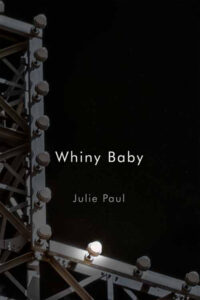Battles waged and lost
Whiny Baby
by Julie Paul
Montreal: McGill-Queen’s University Press, 2024
$19.95 / 9780228020745
Reviewed by Catherine Owen
*

Reading Julie Paul’s collection of poems in seven sections called, with a wink-wink, Whiny Baby, I started contemplating just how many overtly midlife books there are.
When I was in my twenties, I was obsessed with reading works by the very old, whether it was poetry by PK Page or the journals of May Sarton or Florida Scott Maxwell. The midlife writer, however, completely passed me by during that era, as if one leapt from fresh ingénue to gilded crone in one fell swoop.

Now that I’m also, like Paul, in the general zone called middle age, I appreciate literature that stems from this time of menopause, children leaving (or long left from) home, thoughts on retiring, possibly solitude or else maybe caring for one’s parents. A span of years one imagined would be dull are not, in fact, but instead are filled with so much flux, so many challenges. And the beauties too, one hopes, of loving detachment from prior fretful preoccupations, especially with elusive concepts of perfection and comparison.
Victoria resident Paul leaps into this melee and does so with a willingness to be a bit messy and random and, even, unlike too many Canadian poets, funny! Lately, I’ve been reading poetry books ordered online or given to me that strike me mostly by their relentlessly sombre tone, their tedious symbologies, the way their lack of sharp diction or sonorous rhythms puts me in a coma of water. I simply can’t finish these collections because nothing in them has the remotest capacity to stir, offend, rupture. They are simply artifacts, Mary Oliver’s contrived and pale spectres.
Paul mostly doesn’t write like that (phew!), but instead, throughout many of her lyrics and especially the raggedly-long, allusion-laden piece, “Greener Grass Mash-up,” allows for the unknowable, the lunge, the weirdo-auralities of being fully alive in all one’s rare moments.
She will insert the raucous owl’s call, “Hoo-hoo, hoo-hoo, hoo-hoo, hoo-hoooooah”—which resonates with the implied boo-hoo of the proposed whiny baby, in the poem “Birding at Night”—but also evoke the paced solemnity of Elizabeth Bishop in the lines of “Before the Divorce”: “and you, the four reasons they’ve stayed together, / walk among the fancy boats with waffle cones, / counting seals in the oily harbour.”
Plus, Paul (The Rules of the Kingdom) asks questions and ponders belief systems—“I don’t believe in sticking to blooming where you’re planted, / but if planted, yes, by all means flower away” (from “Whiny Baby”)—enacts, in “Les Ruelles Vertes,” a punch of a sonnet on geographical transitions in “Montreal, you eat our young,” slams out a French-titled haibun, delivers a stirring “Grief Duplex,” and then, in “Endemic,” draws from Darwin and acknowledges the ironic fantasies many of us have that our environmental disasters will be “saved by a superhero… / a mass miracle / that only a God I don’t believe in could provide.”
By which to say, there is variety here, of forms and voicings and perspectives. And this refreshes.
I heard Paul read some of these pieces at her launch on Granville Island in April and she glowed with the quirkiness of the recitation. The long poem, on the interruptive Troll, like Lucy Ellmann’s epic stream-of-consciousness novel, Ducks, Newburyport, allows for digressions on social media, eating disorders, retirement, church, parenting… and then riddles these with references to Shakespeare, Whitman, Lou Reed, Carolyn Forché, and of course, the Three Billy Goats Gruff. On the page it’s more powerful. In performance the word play, extreme enjambments, and italicized segments are hard to follow. But when read, you can return, absorb, or sit deliciously with the ineffabilities.
The final three sections of Whiny Baby feature strong poems about identity like the Jane Kenyon-haunted “Today, at least,” with the delightful image of a woman’s “thighs that still touch each other / like they’re in love,” a piece called “Pondering Desire in Middle Age” where one’s joints creak “like old-growth / in yet another storm,” the moving “Cradle the Roses,” which couples menopause and the quotidian eroticism of a marriage with her “optimistic inner Catholic child” (O how I relate!), a triolet on being an empty nester with the repeated lines, “This table bears the scars of art, / weeping, wax and long division,” and the resonant questions of the Louise Gluck-inflected “The Blocked Writer looks to the Garden,” where queries about one’s literary purpose lead to a metaphorical leap where the mock orange is described as “All perfume, no fruit” and yet loved, unlike the self, who is also worthy of “grace.”
Although the humour behind “I, Vajayjay: Thirteen Ways,” a riff on the excessively-played upon Wallace Stevens piece, eluded me in essence, and a few other pieces like “Work Body Work” felt like they were trying too hard to draw connections, overall Whiny Baby is a diverse offering of entrances into the common and yet infrequently written about life of one woman inhabiting her own time, planting flowers while “knowing full well the battle [she] will wage and lose.”
*

Catherine Owen was born and raised in Vancouver by an ex-nun and a truck driver. The oldest of five children, she began writing at three and published at eleven—a short story in a Catholic school’s writing contest chapbook. Since then, she’s released fifteen collections of poetry and prose, including essays, memoirs, short fiction, and children’s books; her latest are Moving to Delilah (Freehand Books 2024) and The Weather Says (Carbonation Press 2024). She also runs Marrow Reviews, the podcast Ms Lyric’s Poetry Outlaws, the YouTube channel The Reading Queen, and the performance series, 94th Street Trobairitz. She currently teaches at Concordia University and NAIT. [Editor’s note: Catherine Owen has also reviewed books by Sharon McCartney, Andrea Scott, Tom Wayman, Chris Walter, Andrea Warner, Aaron Chapman, Emelia Symington-Fedy, Sean Kelly, Jason Schreurs, and Adrienne Fitzpatrick for BCR.
*
The British Columbia Review
Interim Editors, 2023-25: Trevor Marc Hughes (non-fiction), Brett Josef Grubisic (fiction and poetry)
Publisher: Richard Mackie
Formerly The Ormsby Review, The British Columbia Review is an online book review and journal service for BC writers and readers. The Advisory Board now consists of Jean Barman, Wade Davis, Robin Fisher, Barry Gough, Hugh Johnston, Kathy Mezei, Patricia Roy, Maria Tippett, and Graeme Wynn. Provincial Government Patron (since September 2018): Creative BC. Honorary Patron: Yosef Wosk. Scholarly Patron: SFU Graduate Liberal Studies. The British Columbia Review was founded in 2016 by Richard Mackie and Alan Twigg.
“Only connect.” – E.M. Forster